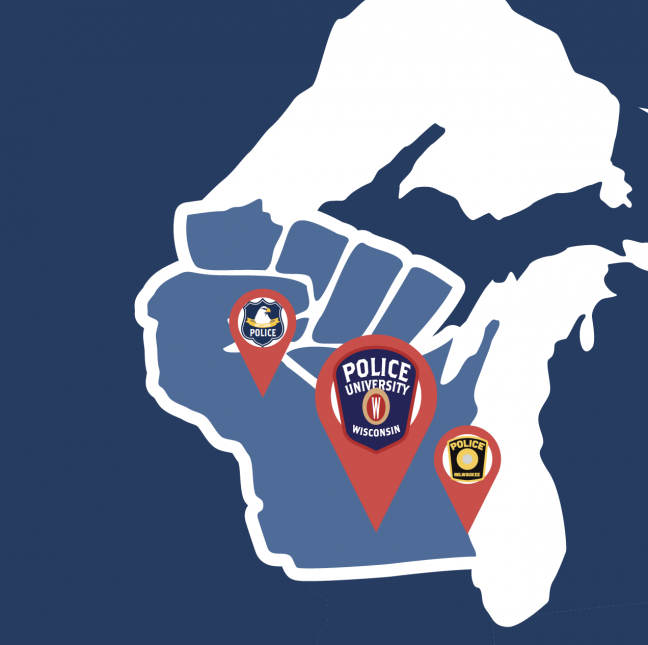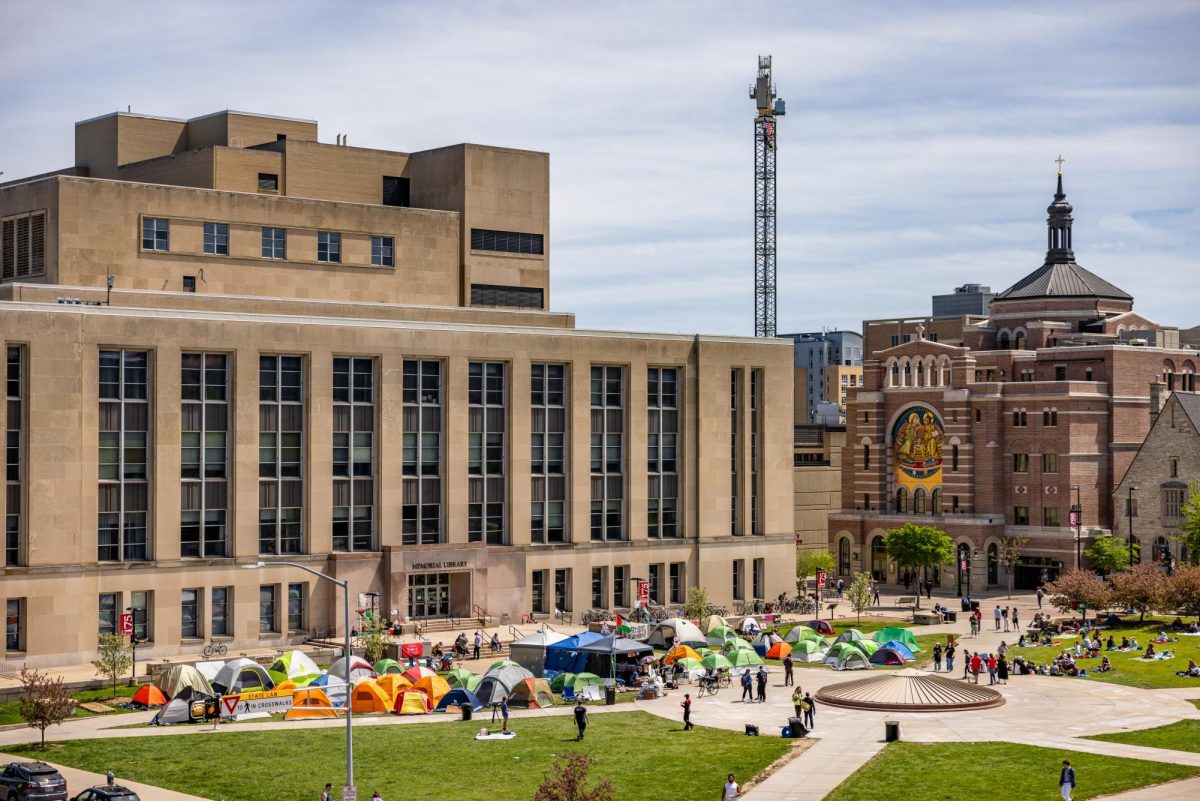UW-Eau Claire student activists were shocked when members of their football team, who mocked a Black Male Empowerment group by insinuating they would burn a cross at a “White Male Empowerment” meeting on Snapchat, and an individual who wrote on the door of an Indigenous student in the dorms to “go back to the rez,” faced no disciplinary action.
UW-Milwaukee student activists justified their demands for defunding their university police with the fact that the police officer who shot Jacob Blake started his career at the UW-Parkside campus just a short distance away.
UW-Madison students questioned who their police force was established to protect after the University of Wisconsin Police Department assisted local police in deploying pepper spray at protesters — many of whom were students.
These incidents resonated with UW System students and fueled ongoing conversations about public safety on campuses last year, against the backdrop of a nationwide movement to reexamine policing after the murder of George Floyd.
Students at UW-Madison, UW-Eau Claire and UW-Milwaukee rallied for change in their police departments last fall. While some of the changes UW-Madison activists hoped for will come to fruition this fall, student advocates believe the work to reimagine public safety on UW campuses is far from over.
Calling co-responders to UW
The tension between students and UW-Madison administration over policing issues reached a peak last fall with a “Cops Off Campus” march calling for UWPD to be dismantled, followed by an Associated Students of Madison vote of no confidence in the department.
But, before the start of the academic year brought activism to campus grounds, an anonymous student post on the Instagram page “BIPOC at Wisco” ignited discussion among student activists about police-hospital transport and the role of campus police in mental health-related calls.
In the July 2020 Instagram post, a student recounted their negative experience with UWPD during police-hospital transport after officers responded to the student’s mental health-related call. The post prompted a statement from University Health Services vowing to reexamine the police-hospital transport system in collaboration with UWPD.
Over a year later, UWPD and UHS have something to show for the nine-month collaboration they announced in January to enhance mental health crisis responses. The two campus entities will launch a co-responder pilot program this fall to have clinicians respond to mental health-related calls with officers and offer students the option to ride to the hospital in an unmarked UHS vehicle with clinicians in the place of police.
Historically, UWPD responded to mental-health related calls alone, Director of Mental Health Services Sarah Nolan said. Currently, if someone needs to be hospitalized, the police will be called to accompany and transport them.
“There are times in our society, broadly and certainly on campus, where police are called because people don’t have anybody else to call, and that’s hard probably for police and for students,” Nolan said. “And so what I would like us to be able to do is to provide some level of mental health support for when mental health support is what is needed.”
Nolan said the pilot program is in its final planning stages and could be launched within a month. UWPD Chief of Police Kristen Roman views the pilot as a method to bring “the right tool for the job” in situations where police have often been used as the catch-all solution.
While the co-responder program will start by focusing on mental health calls on campus for students in university housing, Roman said UWPD and UHS are in conversation with the City of Madison and the Madison Police Department about how they can work together to respond to off-campus mental health calls.
The hours of operation for the pilot will be established after UHS purchases a vehicle and completes the hiring process of two clinicians who will be dedicated to the pilot.
Looking back on the Instagram post that spurred the collaboration, Nolan said the “powerful” student story served as a great starting point, but she believes the co-responder program that came out of the initial discussions will have a “stronger impact” than if the campus only addressed police-hospital transport.
“There was sort of this underlying reality — that many of us felt like mental health services and mental health clinicians were missing from other places besides transports,” Nolan said. “It just seemed pretty clear to many of us who have been working in our fields for a long time that this is not just about hospital transports. It’s about putting in mental health support all over this campus.”
Cross-campus collaboration
Over the course of the nine-month collaboration, Nolan said UHS looked through hours of body camera footage, walked through UWPD data and reviewed real situations officers experienced to try to understand what the current response system was to mental health crises with campus police involved.
Nolan said the campus entities met with ASM and members of the grassroots student organization, the BIPOC Coalition. UHS acquired parts of an anonymous survey taken by the BIPOC Coalition to read some responses directly from students about their experiences with UWPD.
ASM Chair Adrian Lampron, who was a representative for the ASM Student Council last year, was involved in discussions around UWPD and UHS’s crisis responses.
Lampron said the process of putting together the co-responder model and alternate transport system was hard for several student leaders and activists because they felt they were regularly shut down by the departments they were trying to work with.
“Student leaders had a couple of meetings with UWPD folks that basically really quickly deteriorated, so it was hard to continue working with them,” Lampron said. “The students came in wanting to do the work, and UWPD was really resistant to going to that kind of conversation.”
UW-Madison senior and BIPOC Coalition co-founder Juliana Bennett said while it was difficult working with UWPD through the tension, they found an “understanding” in the co-responder program.
Bennett said, however, it is important to recognize the historical lack of trust between students and UWPD has existed long before last summer’s protests as it is one of many institutions on campus which share the faults of systemic racism. She referenced the UW-Madison Public History Project, which documented a “history of mistrust” between the department and the campus community.
“I’m frustrated that still we are trying to pin this lack of trust with UWPD and by extension, the UW administration, to an event that happened just this past year,” Bennett said. “Because that is simply not the case. It is something that has been happening at UWPD since its inception.”
Bennett, who is also the District 8 alderperson for the campus area, said having mental health clinicians respond to calls was one of the main goals of student activists over the past year, and the co-responder program is still a step in the right direction.
“When you are in that really deep and dark mental state, for that situation to be made worse by a responder to that situation is just reprehensible and something no student should have to go through,” Bennett said.
With this sentiment at the heart of conversations last year, ASM discussed earmarking a lump sum in their internal budget for a community mental health intervention model start-up cost. Lampron said they still need to do a budget alternation this year to move money into the line item for a crisis response team or similar initiatives.
Nolan said the university is working with ASM to use those funds to pay for the vehicle for one year. The rest of the money for personnel and the pilot will be reallocated from other areas of UWPD and UHS’s existing funding.
As part of their Racial Equity Initiative, UWPD will also launch an online dashboard this fall to increase transparency about the department’s contact with students and community members. Roman said the dashboard will showcase use of force incidents, calls for services, complaints and discipline data — much of which the department already displays on its website.
But, the new tool will allow users to filter the data by demographic factors such as race, ethnicity, gender, age and affiliation to the university to provide a clearer picture of the department’s actions across campus.
The dashboard will also show the UWPD’s policies surrounding training, protests, use of force and other areas Roman said they chose based on campus listening sessions and feedback from their Police Advisory Council. After the dashboard’s anticipated launch this October, Roman said it will eventually offer surveys to campus community members about the department and display the results online to inform future policy decisions.
“[What] we’re trying to accomplish with this data dashboard is again really to inspire trust and partnership with our community, to inform any advocacy and continuous improvement, so we may look at this data and find that we’re right where we want to be,” Roman said. “Or we might find that we’re … off the mark and so this can help us identify where we want to continue to improve.”
Same battle, different campuses
UWPD was not the only campus police force in the UW System faced with a wave of student advocacy pushing for change when classes resumed last fall.
For many students across the state, the return to campus last September after a summer of protesting police violence and systemic racism in their communities meant it was time to turn their focus to campus police forces.
UW-Milwaukee students Paris Miller and Rory Donovan said their organization, Students for a Democratic Society, held rallies at the beginning of the school year vocalizing their discontent with the UW-Milwaukee Police Department.
SDS delivered a list of demands, including asking for the department to be defunded or disbanded, to UW-Milwaukee’s chancellor laying out what reforms they hoped to make to UWM-PD.
“The UWM police budget is around $3 million, which is the highest of the UW campuses — even higher than UW-Madison — which is ridiculous because our campus is smaller,” Donovan said.
While they raised concerns about the amount of funding allocated toward UW-Milwaukee police and the history of systemic racism seeded in police forces, Donovan said the university engaged very little with SDS.
In a statement to The Badger Herald, UW-Milwaukee spokesperson Michelle Johnson said Chancellor Mark Mone sent a letter to SDS in response to their demands in December 2020, which stated the university was not in favor of disbanding its police force or reallocating their services to other campus units. In the letter, Mone wrote other campus departments wouldn’t be able to handle the amount of calls the UWM-PD receives if services were rerouted.
Johnson said the university also implemented a police advisory committee last September, which has nine members, three of whom are students.
Despite the letter from the chancellor and the creation of the committee, the university’s response fell flat for Donovan and Miller. They both continue to push for a reduction in the size of UWM-PD or full disbandment of the force.
On the other side of the state, UW-Eau Claire student Jacksen Wolff faced a similar battle. Like Miller and Donovan, Wolff, the president of Eau Claire’s Leaders Igniting Transformation chapter, said he was able to work with LIT to establish a list of demands.
“As soon as we arrived on campus [last fall], we began organizing right away,” Wolff said. “We did a large amount of research into the UW-Eau Claire campus police department in terms of their arrest disparity statistics, their budget, that kind of thing.”
Wolff said LIT’s list of demands encompassed the empowerment of Black students as well, as the abolition of UW-Eau Claire’s police department, in exchange for a different public safety model. While UW-Eau Claire’s administration seemed open to creating space and support for BIPOC students on campus, Wolff said starting conversations about changes to policing was difficult.
Wolff said UW-Eau Claire’s police chief seemed open to change and the concerns of the campus community, with the exception of full abolition of the department. UW-Eau Claire did not respond to a request for comment at the time this story was published.
Abolition of a campus police department is a tough goal to meet in the short period of time, Wolff said, but he hopes the work he and other students are doing now can be the first steps toward dismantling the current system and establishing a new one.
“It is my hope that we are able to do more in-person organizing involving the student body with the hopes that we can garner more student support and have a bigger portion of the student population on our side,” Wolff said. “We are going to continue our pressure and continue our organizing in the hopes that we can get a conversation with the administration and get those dialogues started.”
Momentum continues
For the student advocates across the three campuses, the fight for better public safety systems is far from over.
Wolff said a big part of LIT’s plans for this year involve educating students on the institutional problems and history of oppression found in police departments.
Donovan said they hope the greater campus community will have a larger say in how the police function on campus and what duties fall under their jurisdiction. Miller has hopes that coming back to campus will reinvigorate the movement.
“I believe that with the incoming class of freshmen that there’s a very good chance for more improvement, or at least more like-minded people coming together to realize we need less cops on campus at a bare minimum,” Miller said.
Donovan added there might be some “dormant momentum” from last semester from organizers who didn’t see the results they had hoped for from their initial petitions, demands and protests.
Organizers at both campuses have high hopes that their respective campuses will continue to see a growth in support for their causes.
“This is a process that takes numerous, numerous years, and right now, my job as an organizer is still to lay the foundation of organizing on this campus,” Wolff said. “I imagine it will be another three to four ‘generations’ of organizers before we see any true change on our campus or in our community. But, of course we can always hope for a more quick and abundant transition.”
While UW-Madison students were able to achieve a co-responder model and an alternative to police transport, Lampron said ASM will keep pushing for a dedicated crisis response system based on the City of Madison’s Community Alternative Response Emergency Service program — which sends mental health workers and a paramedic to address mental health crises instead of mental health workers and the police co-responding.
An ideal goal, Lampron said, would be to get the city to expand their CARES program to cover the campus entirely or partially with UW-Madison’s co-responder program covering University Housing.
Lampron added UW-Madison could have responded better to calls for defunding the police or reallocating some of their resources — particularly since UWPD spent over $6,500 on pepper spray and smoke grenades during Black Lives Matter protests in 2020.
Roman said the co-responder pilot is a step toward repairing the fractured trust between students and campus police, but she recognizes the program alone is not enough.
“Trust is a complex relationship, and one that takes time and attention,” Roman said. “Hopefully, what comes across with this is that we have dedicated both time and attention to addressing the concerns and the questions and some identified needs within our community.”
In recognition of students’ tense relationship with UWPD that has roots going back to long before last year, Bennett believes UW-Madison and other higher education institutions should take tangible steps toward restructuring police departments into scaled-down campus security models that focus less on punitive measures like citations and more on the well-being of students during the crucial development years in their lives.
“I would like to see a model that is more focused on catching the issues before they happen and … on recovery and learning, because that’s why we are here on this campus,” Bennet said. “Not just education-wise, but we’re learning as human beings to be better people, and I think our public safety system should reflect that.”















